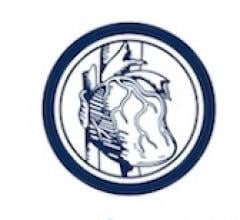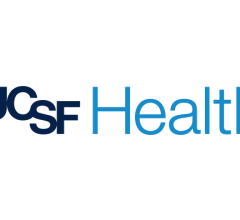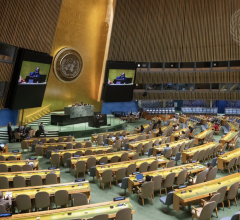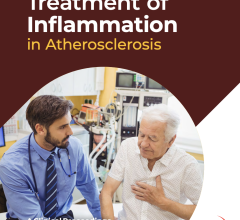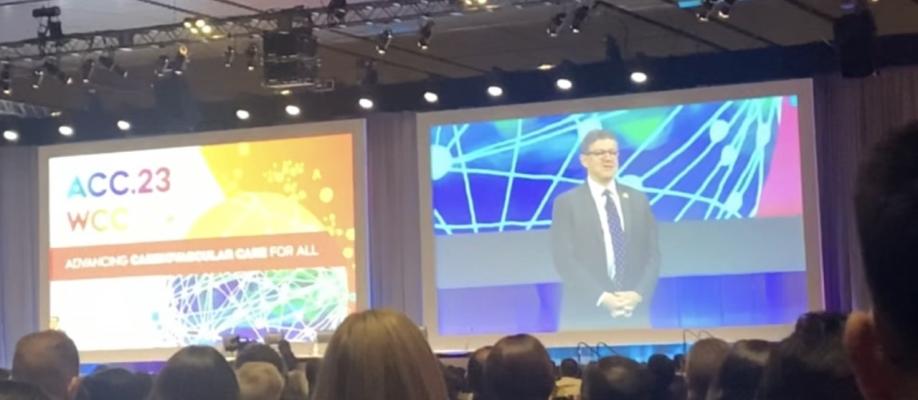
The Opening Showcase of the American College of Cardiology's Annual Scientific Session Together with the World Congress of Cardiology, ACC.23/WCC, featured comments from Ed Fry, MD, ACC President, shown here, as well as the event Chair and World Heart Federation President. The 3-day global gathering of cardiologists is taking place March 4-6 in New Orleans, LA.
March 4, 2023 — Of the immense volume of valuable information offered and exchanged during the first day of the American College of Cardiology's Annual Scientific Session Together with the World Congress of Cardiology, ACC.23/WCC, the DAIC/dicardiology.com editorial team has selected a sampling of session highlights from our notebooks of top ACC.23/WCC news.
Opening Showcase Highlights Volume, Value of Programs
The ACC.23/WCC Opening Showcase kicked off the 3-day global gathering with enthusiastic greetings from ACC President Ed Fry, MD, FACC and World Heart Federation President Daniel Jose Pineiro. Pineiro, a Full Professor of Medicine, Universidad de Buenos Aires, Argentina, applauded the partnership and reinforced the important collaboration amongst global cardiologists. A leader and convener in global cardiovascular health, the World Heart Federation (WHF) champions heart health and acts to reduce the global burden of heart disease and stroke. With membership of more than 200 heart foundations, scientific societies and patient organizations in more than 100 countries is an active hub, promoting heart health and driving change at the local, regional and global level. As the principal representative body of the global cardiovascular community, WHF brings together a diverse network of multi-sectoral actors to share knowledge, guide policy, and give people the tools they need to live longer, healthier lives.
On behalf of ACC leadership, Fry, who took the helm at ACC in March, 2022, is Chair of the Ascension National Cardiovascular Service Line (Indianapolis, IN). He noted the long and notable partnership between ACC and the city of New Orleans, noting that ACC was the first major conference to return in 2007 after Hurricane Katrinia 2005 devastated the region.
In order to best offer a snapshot of the offerings, here, then, is a compilation of comments enthusiastically shared to a full house in the Great Hall at the Morial Convention Center in New Orleans, LA, by ACC.23/WCC Chair Douglas Drachman, MD, FACC.
Drachman serves as Director of Education, Massachusetts General Hospital Heart Center and Director of its Interventional Cardiology Fellowship Program (Boston, MA). He provided a thorough review of the comprehensive line-up of scientific sessions, clinical study findings, featured clinical research, interactive programming, digital poster presentations, keynote addresses and awards which comprise the event. Drachman told the audience that the three-day agenda has over 300 in person sessions across 11 learning pathways with a variety of formats that allow participants, in person and virtually, to explore the latest science and innovation and to learn practice changing updates from world experts.
“Together with the World Congress of Cardiology, live in New Orleans and virtually around the world, to many of you who made the journey to New Orleans to join your colleagues and friends in person, and to those who are joining us from around the globe, we thank you. Our registration has been remarkably strong reaffirming that cardiovascular professionals in our industry partners continue to value in person education, discussing the latest science, networking and collaborating with respected colleagues.”
Said Drachman, “Building on the overwhelmingly positive feedback from ACC 22, you will find more in person interactive environments offering unique ways to learn, engage and connect. These include more heart to heart and engage stage sessions, moderated and poster board flat posters, sessions, hands on skills training, learning destination industry sessions and last but not least, our new March Matchup stage featuring an all-star lineup of game show style sessions that we promise will be high energy and highly educational.”
He applauded the work of Vice Chair Katie Berlacher, MD, MS, FACC, who is serving as ACC.23 Vice Chair. During a pre-event Media Briefing, Berlacher enthusiastically drew attention to the late breaking clinical trials to be presented, saying, “This is practice-changing science.” Berlacher is an Assistant Professor of Medicine at University of Pittsburgh Medical Center, Program Director – Cardiovascular Fellowship, Associate Chief of Education, and part of the UPMC Heart and Vascular Institute. She is currently serving as chair of the ACC Lifelong Learning Oversight Committee.
Drachman offered these comments on the program planning for this year’s session:
“We're once again here to learn, connect and experience over the next three days ACC 23 WCC will provide wide ranging education that combines the latest scientific advances with clinical pearls to incorporate into your daily practice. This year is unique as ACC has partnered with the World Heart Federation making this meeting a truly global collaboration between two organizations dedicated to improving lives of patients around the world. The ACC remains deeply committed to achieving equitable cardiovascular care and improving heart health for all and to that end, we are excited to emphasize a focus on diversity, equity and inclusion throughout the educational programming and in our engagement of faculty.”
He made special mention of the five late breaking clinical trial sessions which will examine a wide range of investigations. The first three of those were presented immediately following the Opening Showcase. Those, he said, include minimally invasive surgery for valvular heart disease, electronic tools to enhance clinical decision making, wearable monitors to evaluate heart failure or myocardial infarction, and vigorous exercise for individuals hypertrophic cardiomyopathy, as well as featured clinical research sessions exploring new therapies for uncontrolled hypertension, the impact of ketogenic diet on lipid levels and cardiovascular risks, virtual team based care and heart failure and much more.
The first of the ACC.23/WCC Late Breaking Sessions, held immediately after the Opening Showcase, unveiled findings from CLEAR, TRILUMINATE Pivotal Trial, and STOP-CA Trial. The DAIC/dicardiology.com editorial team has featured each of those clinical trials and summary findings in related coverage (see below).
New this year, said Drachman, is a session focused on clinical and investigative horizons provides hot takes on topics that range from biomarkers and preeclampsia to pulmonary thrombectomy to improving equitable access to an enrollment and clinical trials. Additionally, he urged attendees to take part in a range of interactive educational opportunities. A condensed summary of his rundown of ACC.23/WCC highlights follows:
“Join ACC and World Heart Federation leaders, global experts and others at the Heart to Heart stage for informal discussions on topics ranging from lessons in leadership health equity, ethics, bridging the digital divide, and the use of social media in medicine. Visit the Engage stage where you can cheer on your favorite ACC chapter in the annual and competitive Jeopardy competition, and witness the brilliant future of scientific research at the ACC young investigators awards. Let the clinical games begin in the all new March Matchup sessions a unique classroom designed to capture the excitement and engagement of major sports tournaments like the NCAA basketball March Madness.”
The Expo Floor at ACC.23/WCC provides an opportunity to spend time with over 280 of ACC industry partners including 90 new partners highlighting the latest advances in pharmaceuticals, image acquisition and analysis, electrophysiology and support devices, health information technology, and other services to optimize patient care and outcomes from their booths. The Future Hub interactive educational space, he noted, is designed to inform, educate and inspire you with the latest innovations in digital health, medical devices, big data and more. Drachman concluded by commending the work of the planning committees involved, saying, "We have continued our efforts to make ACC 23 WCC as inclusive and inviting as possible.”
Keynote Address: Cardiac ICU
The ACC’s Annual Louis F. Bishop Keynote Address was presented by Professor Susanna Price, a consultant cardiologist, introduced as the solo intensivist in the United Kingdom. She presented an engaging and thought-provoking presentation focused on “The Evolution of the Cardiac ICU: The Present Is Not the Past Nor Can It Be the Future.” In doing so, she featured a historical and forward-looking perspective on the Evolution of Cardiac ICU, saying she has always been inspired by James Burke’s quote: “Why should we look to the past in order to prepare for the future? Because there is nowhere else to look.” The DAIC/dicardiology.com editorial team will be covering Professor Price’s comments in further detail in ongoing ACC.23/WCC coverage.
Following the keynote was the Critical Care Cardiology Intensive 1: Cardiogenic Shock. This session offered a range of presenters discussing challenges, different scenarios and interactive session with case presentation on “Pandemic Travel, Fever and Shock-The Cardiologist’s Role” by Sana Ahmad, D.O. Cardiology Fellow, Lenox Hill Hospital, Northwell Health, (Brooklyn, NY). It was followed by “Mixed Cardiogenic Shock: What, Why and How?” by David Morrow, MD, Director of the Cardiac Intensive Care Unit (CICU) at Brigham and Women’s Hospital (Boston, MA) and professor of medicine at Harvard Medical School. The final presentation focused on “Noninvasive and Novel Methods to Measure CO/CI/SVR to Diagnose Cardiogenic Shock/Mixed Shock” delivered by Herbert Patrick, MD, Jefferson Health (Phil, PA). Panelists included moderator Robert Roswell, MD, FACP, FACC, who serves as Associate Dean for Diversity, Equity & Inclusion, Associate Professor of Cardiology & Science Education, Hofstra/Northwell (Brooklyn, NY), who was joined by: David Dudzinski (Belmont, MA); Sandra Oliver-McNeil (Traverse City, MI); Michael Solomon (Rockville, MD); Penelope Rampersad( Cleveland, OH); and Jason Katz, MD (Durham, NC).
Young Author Achievement Award Recipients
The first day of ACC also found the organization recognizing recipients of the William W. Parmley Young Author Achievement Award. Two researchers were recognized for their outstanding papers in the Journal of the American College of Cardiology, JACC, during the event. Ons Marsit, PhD, and Quincy A. Hathaway, PhD. This prestigious award recognizes two primary authors who published papers in JACC and are within five years of completing their training requirements for a specialty board certification or PhD.
Marsit conducted research at the Institut Universitaire de Cardiologie et de Pneumologie de Québec–Université Laval in Québec, Canada. She is being honored for her study: “Effects of Cyproheptadine on Mitral Valve Remodeling and Regurgitation after Myocardial Infarction.” Her mentor Jonathan Beaudoin, MD, is also being recognized. Marsit’s paper was published in the August 2, 2022, issue of JACC.
Hathaway conducted research at the Heart and Vascular Institute at West Virginia University in Morgantown, West Virginia. He is being honored for this study: “Ultrasonic Texture Features for Assessing Cardiac Remodeling and Dysfunction.” His mentor Partho P. Sengupta, MD, DM, is also being recognized for their contributions. Hathaway’s paper was published in the December 6, 2022, issue of JACC.
The award, named for Dr. William W. Parmley, a past editor-in-chief of JACC, honors two young authors per year. Papers are judged on originality, methodology, presentation and importance. The award commends not only the young investigator but also the program in which he or she is working. The Parmley Prize is funded by Elsevier.
“William Parmley was a trailblazer for innovation among cardiovascular researchers,” said JACC Editor-in-Chief Valentin Fuster, MD, PhD, MACC. “I feel proud that JACC continues to celebrate his legacy by recognizing up-and-coming researchers, as well as their mentors and institutional research programs.” In addition to a plaque, the award includes special recognition at the ACC.23/WCC Convocation Program at the JACC Editorial Board meeting and in an upcoming issue of JACC, as well as a stipend to attend an ACC educational event.
More information: acc.org


 February 04, 2026
February 04, 2026 




